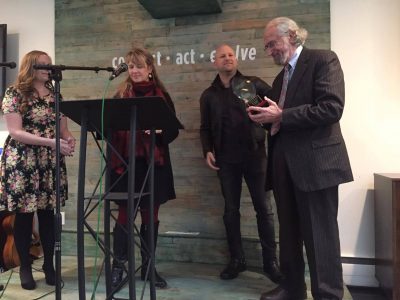
Many audience members at the Humanist Hub’s Harvard Humanist of the Year Award celebration could not hold back tears as Amy Fairchild finished performing the song she wrote after visiting her brother in rehab.
The Humanist Hub, a nonreligious community at Harvard University, presented their 2016 Humanist of the Year Award to Joseph Gerstein, the president and founder of SMART Recovery, an “evidence-based, secular alternative to Alcoholics Anonymous,” according to the award celebration’s event page.
Some conventional strategies for addiction recovery, such as AA, are focused on human powerlessness before addiction. “The Twelve Steps of Alcoholic’s Anonymous” outline a path on which the alcoholic “made a decision to turn [their] will and [their] lives over to the care of God,”and “admitted to God, to [themselves,] and to another human being the exact nature of [their] wrongs.”
This approach differs fundamentally from that of SMART Recovery, said Shari Allwood, executive director of SMART Recovery.
“As an MD, Joseph had a number of people who would come to him who he knew were struggling with addictions,” Allwood said. “Twenty-five or more years ago, the pat answer would be, ‘You need to go to AA or to [Narcotics Anonymous],’ and you found a lot of people who were saying, ‘That’s not suitable for me. I am not powerless, I do not believe in a higher power — this is just not going work for me.’”
Gerstein’s program works with Rational Emotive Behavior Therapy to teach people how to coach themselves through negative thinking and be aware of their emotions, said Greg Epstein, the humanist chaplain at Harvard.
“Addiction starts out as a response to stress, and we use drugs or addictive behaviors as the way of managing real stress that we feel,” Epstein said. “We develop thought patterns and behavior patterns based on that, trying to make us feel better.”
According to The National Center on Addiction and Substance Abuse’s website, “40 million Americans ages 12 and older — or more than 1 in 7 people — abuse or are addicted to nicotine, alcohol or other drugs.”
This data, however, does not take into account other addictive behaviors, such as gambling or overeating. Epstein, who has been through the SMART Recovery program, said anything can become an addiction.
“I was writing a book and I couldn’t get writing done,” Epstein said. “I was very stressed out by other things in my life and I developed an internet addition, going online instead of getting my work done. I used the technique and it got me past that.”
Epstein said the SMART Recovery program treats addiction like a maladaptive behavior pattern, not a disease.
Charles Novak, a substance abuse counselor who works for SMART Recovery, and a former participant in the program, said the program helps fight addictive behaviors by empowering addicts to “have control over their own feelings and thoughts.”
“It’s not the activating event that creates emotional consequences, but it’s our beliefs about it,” Novak said. “If my girlfriend breaks up with me, I feel mad and sad. But it’s not that my girlfriend broke up with me, but my belief that I may be alone, I might not find anyone else, I might not be a worthy person if she leaves me. It helps me make rational decisions if I challenge these irrational believes.”
Novak tried AA, but said he quickly became frustrated with the program.
“I found an early recovery — not because of it [AA], but in spite of it,” he said. “I can’t imagine trying to tell somebody that the best thing you can do is start thinking about yourself as powerless.”
Novak explained that the usefulness of SMART extended to his life after recovery.
“In living life, there was more than just not using drugs — it was helping me to make right decisions, dealing with depression and anxiety,” Novak said. “You’re going to make decisions anyway — you might as well slow down and make rational ones.”



























































































































